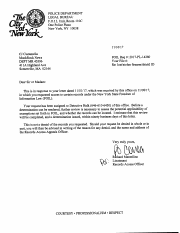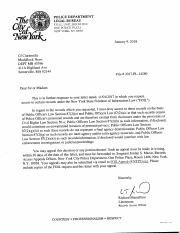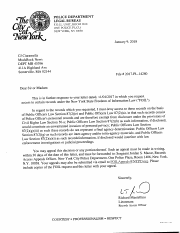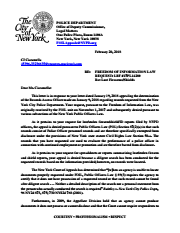NYPD lost and stolen guns 2015-2016
| Tracking # |
2017-PL-14280 |
| Submitted | Nov. 1, 2017 |
MuckRock users can file, duplicate, track, and share public records requests like this one. Learn more.
Communications
From: CJ Ciaramella
To Whom It May Concern:
Pursuant to the New York State Freedom of Information Law (1977 N.Y. Laws ch. 933), I hereby request the following records:
- All PD 520-150 lost/stolen firearm/shield ID reports filed by NYPD officers between Jan. 1, 2015 and Dec. 31, 2016.
- Any spreadsheets or reports created by the department summarizing lost/stolen firearm and shield reports in the above time frame
The requested documents will be made available to the general public, and this request is not being made for commercial purposes. The requester is a full-time journalist at Reason Magazine.
In the event that there are fees, I would be grateful if you would inform me of the total charges in advance of fulfilling my request. I would prefer the request filled electronically, by e-mail attachment if available or CD-ROM if not.
Thank you in advance for your anticipated cooperation in this matter. I look forward to receiving your response to this request within 5 business days, as the statute requires.
Sincerely,
CJ Ciaramella
From: Muckrock Staff
To Whom It May Concern:
I wanted to follow up on the following Freedom of Information Law request, copied below, and originally submitted on Nov. 1, 2017. Please let me know when I can expect to receive a response, or if further clarification is needed.
Thanks for your help, and let me know if further clarification is needed.
From: New York City Police Department
An acknowledgement letter, stating the request is being processed.
From: New York City Police Department
The request has been rejected by the agency.
From: CJ Ciaramella
To whom it may concern:
This is an appeal under New York's Freedom of Information Law regarding my FOIL request # 2017-PL-14280. The request, sent on 11/01/17 and received by the NYPD on 11/08/17, sought the following records:
- All PD 520-150 lost/stolen firearm/shield ID reports filed by NYPD officers between Jan. 1, 2015 and Dec. 31, 2016.
- Any spreadsheets or reports created by the department summarizing lost/stolen firearm and shield reports in the above time frame
It can be found online here: https://www.muckrock.com/foi/new-york-city-17/nypd-lost-and-stolen-guns-2015-2016-45396/
In response, the NYPD claims the disclosure of such records would constitute the release of personnel files, barred under Civil Rights Law Section 50-a, as well as an unwarranted invasion of personal privacy, barred by Public Officers Law 87(2)(b). In addition, it claims the reports are not final agency determinations, are inter-agency or intra-agency materials, and that their release would interfere with law enforcement investigations or judicial proceedings.
First, the NYPD relies on an overbroad interpretation of §50-a. The original legislative intent of the statute, as the Court of Appeals wrote, was “to limit access to said personnel records by criminal defense counsel, who used the contents of the records, including unsubstantiated and irrelevant complaints against officers, to embarrass officers during cross-examination. Capital Newspapers v. Burns, 67 NY2d 562, 568 (1986). The Court of Appeals has also held that the purpose of §50-a "was to prevent the release of sensitive personnel records that could be used in litigation for purposes of harassing or embarrassing correction officers.”
Further, the courts have stated that the bar to disclosure imposed by §50-a deals with personnel records that "are used to evaluate performance toward continued employment or promotion." The requested records are not performance evaluations. They are reports of public safety incidents.
NYPD also asserts that the records in question, if released, would constitute an unwarranted invasion of privacy, but the records are not covered by the privacy protections afforded by 87(2)(b). Courts have found that records that are relevant to the performance of a public employee' s official duties are disclosable and result in a permissible rather than an unwarranted invasion of personal privacy. Farrell v. Village Board of Trustees, 372 NYS 2d 905 (1975); Gannett Co. v. County of Monroe, 59 AD 2d 309 (1977), aff'd 45 NY 2d 954 (1978); Sinicropi v. County of Nassau, 76 AD 2d 838 (1980); Geneva Printing Co. and Donald C. Hadley v. Village of Lyons, Sup. Ct., Wayne Cty., March 25, 1981; Montes v. State, 406 NYS 2d 664 (Court of Claims, 1978); Steinmetz v. Board of Education, East Moriches, Sup. Ct., Suffolk Cty., NYLJ, Oct. 30, 1980; Capital Newspapers v. Burns, supra.
In this instance, the safeguarding of officers' badges and firearms is clearly relevant to the performance of their official duties. The number of police firearms and badges lost every year is also a pressing public safety matter, and the public’s right to be informed of the department’s overall performance here far outweighs the privacy concerns.
But in any case, the issue of the applicability of §50-a and 87(2)(b) are both moot because segregable portions of records containing exempt materials are still public record under FOIL. An agency may delete identifying details in the instance where disclosure would otherwise constitute an unwarranted invasion of personal privacy. N.Y. Pub. Off. Law § 87(2)(b) and 89(2) (McKinney 1988); Short v. Board of Managers, 57 N.Y.2d 399, 442 N.E.2d 1235, 456 N.Y.S.2d 724 (1982). See, e.g., Harris v. City University, 114 A.D.2d 805, 495 N.Y.S.2d 175 (1st Dep't 1985).
Any privacy concerns or question of personnel records are mitigated by simply redacting the officers' identifying information.
NYPD also argues that the records are exempt from disclosure because they are inter- or intra-agency records and are not final determinations by the department. Please note that inter-agency materials are construed to mean "deliberative material”— communications exchanged for discussion purposes not constituting final policy decisions. A report of a stolen police firearm or badge is not a memorandum written for discussion purposes. It is a record of a public safety incident occurring during the course of a public official’s duties.
Once again, this is not a blanket exemption. Even if a record is preliminary, an agency is obligated to review it and disclose segregable portions. Gould v. New York City Police Dept., 89 NY 2d 267, 675 NE 2d 808, 25 Med.L.Rptr. 1004 (1996).
NYPD also cites 87(2)(e), which exempts records compiled for law enforcement purposes that would “interfere with law enforcement investigations or judicial proceedings.”
Courts have repeatedly ruled that 87(2)(e) is to be construed narrowly and that the agency must have a specific reason for invoking the exemption.
“Exemptions are to be narrowly construed to provide maximum access, and the agency seeking to prevent disclosure carries the burden of demonstrating that the requested material falls squarely within a FOIL exemption by articulating a particularized and specific justification for denying access.” Capital Newspapers v. Burns, 67 NY 2d 562, 566 (1986); see also, Farbman & Sons v. New York City, 62 NY 2d 75, 80 (1984); and Fink v. Lefkowitz, 47 NY 2d 567, 571 (1979).
The court in Gould further wrote that “…to invoke one of the exemptions of section 87(2), the agency must articulate 'particularized and specific justification' for not disclosing requested documents.”
The NYPD has articulated no specific justification for invoking the exemption and has therefore failed to meet the burden set by courts.
For all the above reasons, I ask that my request be fulfilled and all disclosable portions or responsive records be released. I look forward to your response. Thank you for your time.
Sincerely,
CJ Ciaramella
From:
Good Afternoon:
Please see attached appeal determination. Thank you.
Best,
Jordan S. Mazur
Sergeant
Records Access Appeals Officer
Deputy Commissioner Legal Matters
1 Police Plaza, Room 1406 New York, NY 10038
CONFIDENTIALITY NOTICE: This email and any attachments may contain confidential and privileged information for the use of the designated recipient(s) named above. If you are not the intended recipient, you are hereby notified that you have received this communication in error and that any review, use or disclosure of it or its contents is prohibited and may violate laws including the Electronic Communications Privacy Act. If you are not the intended recipient, please contact the sender and destroy all copies of this communication. Please treat this and all other communications from the New York City Police Department as LAW ENFORCEMENT SENSITIVE / FOR OFFICIAL USE ONLY.
Files
pages



